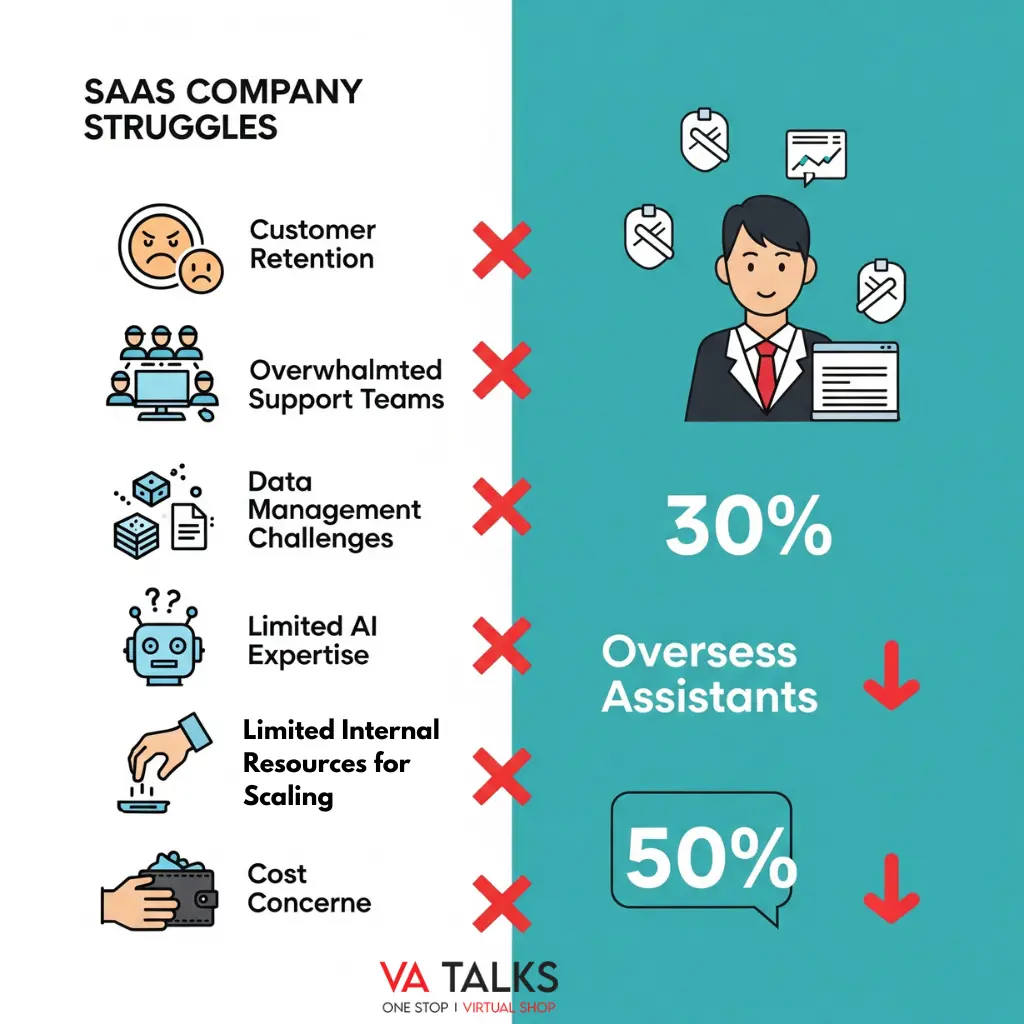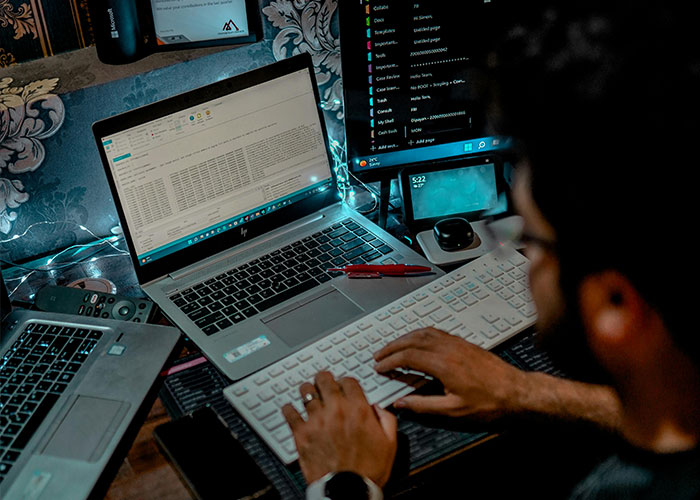SaaS (Software as a Service) companies are in high demand in today’s digital-based economy. These firms assist with cloud-based delivery, subscription models, centralized management, and so on. This demand has increased the emergence of startups and entrepreneurship throughout the USA.
The rapid expansion of this industry means scaling operations, no matter the size of your business, while also satisfying customers. Thus, many companies are reaching out to overseas virtual assistants (VAs) who bring specialized skills for SaaS operational support. They prefer AI-powered virtual assistants who can manage AI-enabled tasks, customers, and data-driven decision-making with finesse.
In this article, we will explore the SaaS companies, what challenges they face, and how AI-powered VAs can help them:
Table of Contents
Understanding SaaS Companies
As mentioned above, SaaS companies develop software applications for various types of brands over the internet. This reduces the need for users to install, maintain, or update programs locally. Instead, customers pay a recurring subscription fee to access the service via a web browser or mobile app.
Where SaaS Companies Struggle
Research suggests that by 2025, 85% of business apps will be SaaS-based. This suggests higher revenue and global reach. However, many SaaS companies still struggle to manage operational bottlenecks during scaling. Common challenges include:
a. Customer Retention vs. Acquisition
Well, acquiring customers is one thing. But keeping them satisfied for months or years can be pretty difficult, especially if your firm is small with not enough team members. Many SaaS companies focus so much on lead generation that they fail to build systems for long-term engagement.
b. Overwhelmed Customer Support Teams
With the high demand, it is common for your customer base to grow. But without enough manpower, support tickets pile up, and response times get delayed, which makes your customers frustrated.
c. Data Management
If you own a SaaS company, similar to Salesforce (CRM), Dropbox (cloud storage), and Google Workspace, it can become difficult to manage vast amounts of customer usage data. While the data is valuable, without proper analysis, you can’t use this information. This prevents accurate forecasting or product improvements.
d. Limited Internal Expertise in AI
AI tools cut down time spent on customer management, marketing automation, and data analytics. However, even with SaaS companies, not all employees have the skills to use these technologies effectively. Without professional support, this can impact your overall business productivity.
e. Cost Concerns
Hiring full-time or in-house specialists, especially in high-cost markets like the US, can strain budgets. For small businesses or startups, it can become a major issue.

How AI-Powered Virtual Assistants Fill the Gap
Most SaaS companies in the US have understood the importance of hiring offshore virtual assistants. They especially look for remote professionals who are familiar with artificial intelligence. These AI-powered virtual assistants are from countries with lower living costs but high skill levels, such as the Philippines, India, Vietnam, or Eastern Europe. They work in sync with SaaS teams across time zones, often providing round-the-clock support.
Read more: Overseas VAs, are they the right choice?
Expertise in AI-Driven Operations
One of the key advantages of hiring remote assistants for SaaS companies is that they are proficient in using AI tools and automation platforms. They can:
- Manage CRM systems that are integrated with AI for predictive customer scoring.
- Automate repetitive tasks like sending onboarding emails, following up on leads, or tagging customer tickets, which speeds up the process.
- Use AI analytics to identify trends in customer behavior, so you can focus on better product recommendations.
Customer Management
It is not an overstatement to say that customer success is the lifeblood of any subscription business. Rather than acquiring new customers, many businesses focus on customer retention. But if your customers are not satisfied, they may not return to you in the future. An offshore virtual assistant can
- Handle customer onboarding. These professionals guide users through the setup process with dedication and empathy.
- Monitor support channels, including chat, email, and social media. They respond quickly to inquiries, so your customers don’t feel frustrated.
- Track usage patterns to identify inactive accounts and initiate re-engagement campaigns.
- Manage feedback collection to ensure customer voices directly inform product development.
You can also hire an overseas virtual assistant, as they operate in different time zones. This means your customers always have someone available to assist them, even outside standard business hours.
Data Collection and Forecasting
Every SaaS company needs to collect data for accurate forecasting. This helps them to plan for growth, allocate resources, and reduce churn. AI-powered virtual assistants help with
- Analyzing customer behavior data from analytics dashboards.
- Preparing monthly reports and retention reports for management review.
- Identifying trends, such as which features customers use the least, which they love, and which customer segments are most at risk of cancellation.
- Predictive analytics, using AI tools to forecast subscription renewals or upsell opportunities.
This proactive approach helps SaaS leaders make evidence-based decisions rather than relying on guesswork.
High-quality, cost-effective services
Did you know that hiring an overseas virtual assistant can be significantly less expensive than hiring one locally? For SaaS-based startups, managing expenses can become difficult. They don’t want to hire full-time employees as the work requirement is low, but they also need skilled support. So, they often go for AI-powered virtual assistants. These specialists charge per hour, so you can settle on paying for a certain hour per week or month.
This reduces your expenses, so you can reinvest the earnings into marketing, R&D, or infrastructure. Moreover, you get access to a wider talent pool with various niches, including:
- Marketing automation,
- Data analytics,
- Technical support,
- Content creation, and so on.
The Bottom Line
While SaaS companies are on-demand, the competition is pretty high. For brands to create a presence in such a competitive market, they need to focus on efficiency, customer satisfaction, and adaptability. However, the budget often becomes a major issue for many new companies. Hiring AI-powered virtual assistants can help them manage such challenges. Virtual onboarding for SaaS companies does not take a long time for VAs. They can easily get accustomed to your business process. And since they are proficient in AI tools, you can expect them to boost your business process.
FAQs
Q.1. Why do SaaS companies hire overseas virtual assistants?
Many SaaS companies hire overseas VAs for
- Niche skills
- Lower SaaS operational cost
- 24/7 operations across time zones, and
- Scale support without increasing overhead.
Q.2. How can AI-powered virtual assistants improve customer success for SaaS companies?
They can automate onboarding processes, respond to customer queries quickly, track usage data, and personalize communications to boost satisfaction.
Q.3. Can virtual assistants handle SaaS data collection and forecasting?
Yes. They can compile customer behavior data, generate retention reports, and use AI analytics to forecast renewals, upsell opportunities, and potential churn risks.
Q.4. Is hiring an overseas VA secure for sensitive SaaS customer data?
Yes, if you follow proper NDAs, secure communication channels, and data protection protocols, overseas virtual assistants are the best support to conduct sensitive data safely.




